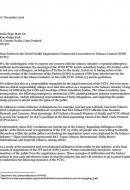Dear Parties to the World Health Organization Framework Convention on Tobacco Control (WHO FCTC):
We, the undersigned, write to express our concern with the tobacco industry’s repeated attempts to infiltrate and undermine the meetings of the WHO FCTC and its subsidiary bodies. We further write to ask you, our colleagues, as delegates of Parties to this treaty, to join us in taking action at the seventh session of the Conference of the Parties (COP7) to protect COPs from interference by the vested interests of the tobacco industry, in line with FCTC Article 5.3 and its guidelines.
We believe that this is a responsibility supported by the legal framework of the FCTC, but even more that an ethical responsibility obliges us to take this action as a response to the tobacco industry’s long history of infiltrating the COPs and meetings of their subsidiary bodies. The tobacco industry uses, among others, the following strategies to undermine COPs: planting tobacco industry representatives on delegations, unduly influencing representatives of Party delegations, and exploiting the public badge process to attend under the guise of the public.
In relation to undue influence of delegations, for example, just last year a British American Tobacco (BAT) employee-turned-whistleblower revealed that BAT bribed FCTC officials from Rwanda, Burundi, and Comoros. Most alarmingly, BAT bribed a Burundi Ministry of Health and FCTC official to secure his “support” for BAT’s positions at the final negotiating round of the Illicit Trade Protocol (ITP) in 2012.[1]
Unfortunately, these BAT revelations are just the tip of the iceberg. Regarding infiltration of the public, at the third round of negotiations of the ITP, 23 of the 28 people who were willing to identify themselves within the public gallery overlooking the negotiation space were employed by the tobacco industry.[2] These individuals represented BAT, Japan Tobacco International, Philip Morris International, and Imperial Tobacco, among others.
As a result of the consistent and overwhelming infiltration of the public by the industry, at the final rounds of negotiations of the ITP and at COPs 5 and 6, Parties unanimously decided to remove members of the public from the negotiation spaces. These examples of infiltration and the Parties’ actions to stop such interference make it clear the industry has and will continue to go to great lengths to undermine the lifesaving measures of the FCTC.
As you know, Article 5.3 of the FCTC makes clear the fundamental and irreconcilable conflict between the interests of the tobacco industry and those of public health. Article 5.3 is the backbone of the treaty—the treaty cannot succeed if tobacco industry interference is not rooted out. In 2008, the Parties to the FCTC unanimously adopted guidelines for Article 5.3. These guidelines, among other requirements, oblige Parties to “not nominate any person employed by the tobacco industry or any entity working to further its interests to serve on delegations to meetings of the Conference of the Parties, its subsidiary bodies or any other bodies established pursuant to decisions of the Conference of the Parties.”[3]
This year, to take action to stop the tobacco industry’s campaign to infiltrate the COPs, the Framework Convention Secretariat sent a note verbale to Parties reminding them of their obligations to not nominate individuals to their delegations with conflicts of interest with the tobacco industry. We commend the Secretariat’s action and commit ourselves at COP7 to securing a decision that will protect the COPs from tobacco industry interference and infiltration.
Fortunately, Big Tobacco’s profits and sales are already on the decline in many parts of the world due to the implementation of the FCTC. Therefore, it comes as no surprise that the industry is becoming more aggressive in its attempts to undermine the FCTC, including through interfering in meetings of the FCTC and its subsidiary bodies. As WHO Director-General Margaret Chan said, “We’ve come a long way, bullies. We will not be fazed by your harassment. […] WHO will not be intimidated, and neither will you. We do not have the riches of the tobacco industry, but we are right and we are resolved.”
We are right and we must be resolved. Therefore, we reiterate our commitment to Article 5.3 and its guidelines and resolve to protect COPs from tobacco industry infiltration and interference once and for all.
Please join us in committing to take action at COP7 to protect COPs from the infiltration and influence of the tobacco industry.
Sincerely,
The following individuals signed on behalf of their delegations:
Willy Alanoca Alavarez, Bolivia
Youssouf Yamaya, Comoros
George G Garue, Liberia
Norma Astudillo, Panama
Sheila Ndyanabangi, Uganda
Individual delegates:
Josefina Correa, Chile
Marco Marichal, Costa Rica
George Norton, Guayana
Kesaundra Alves, Guyana
Sheryl Dennis, Jamaica
Nuntavarn Vichit-Vadakan, Thailand
Bhumindr Butr-Indr, Thailand
Chirawat Yoosabai, Thailand
Pantip Chotbenjamaporn, Thailand
Prakit Vathesatogkit, Thailand
Suthep Petchmark, Thailand
Titiporn Gunvihok, Thailand
Miguel Asqueta, Uruguay
Cc:
Dr. Vera Luiza Da Costa e Silva, Framework Convention Secretariat
Tibor Szilagyi, Framework Convention Secretariat
Oleg Salagay, FCTC Bureau President
Dorcas Kiptui, AFRO FCTC bureau member
Hassan Mohamed, SEARO FCTC bureau member
Reina Roa, AMRO FCTC bureau member
Marcus Samo, WPRO FCTC bureau member
Jawad Al-Lawati, EMRO FCTC bureau member
Samir Rahem, AFRO FCTC regional coordinator
Herculano Seixas dos Santos, SEARO FCTC regional coordinator
Tania Cavalcante, AMRO FCTC regional coordinator
Madeleine Heyward, WPRO FCTC regional coordinator
Sahar Latif Labib, EMRO FCTC regional coordinator
Gert-Jan Rietveld, EURO FCTC regional coordinator
[1] http://www.bbc.com/news/business-34944702
[2]
[3] Article 5.3 guidelines, recommendation 4.9.



